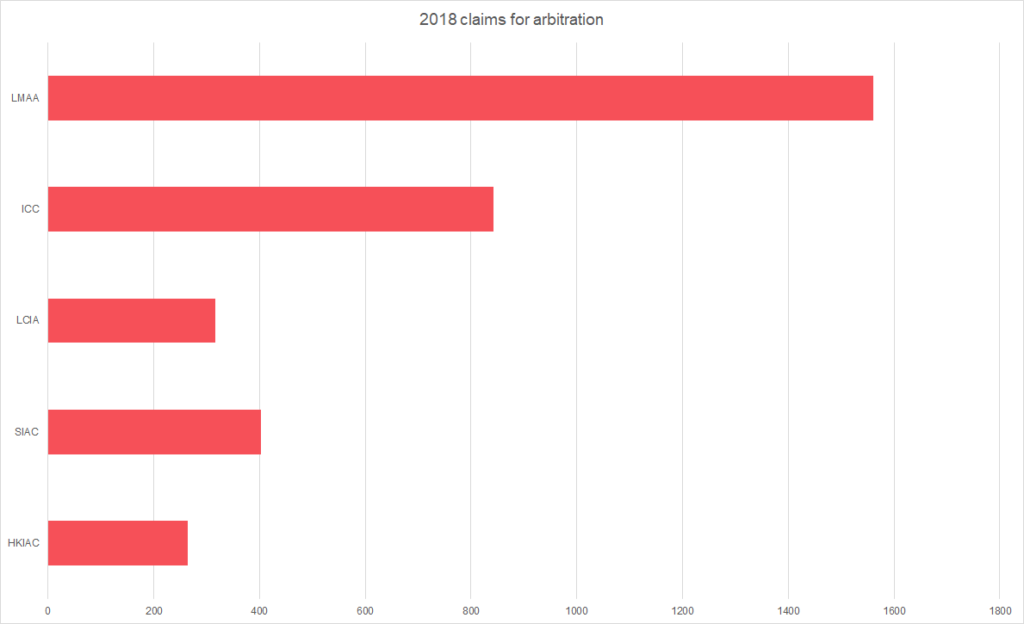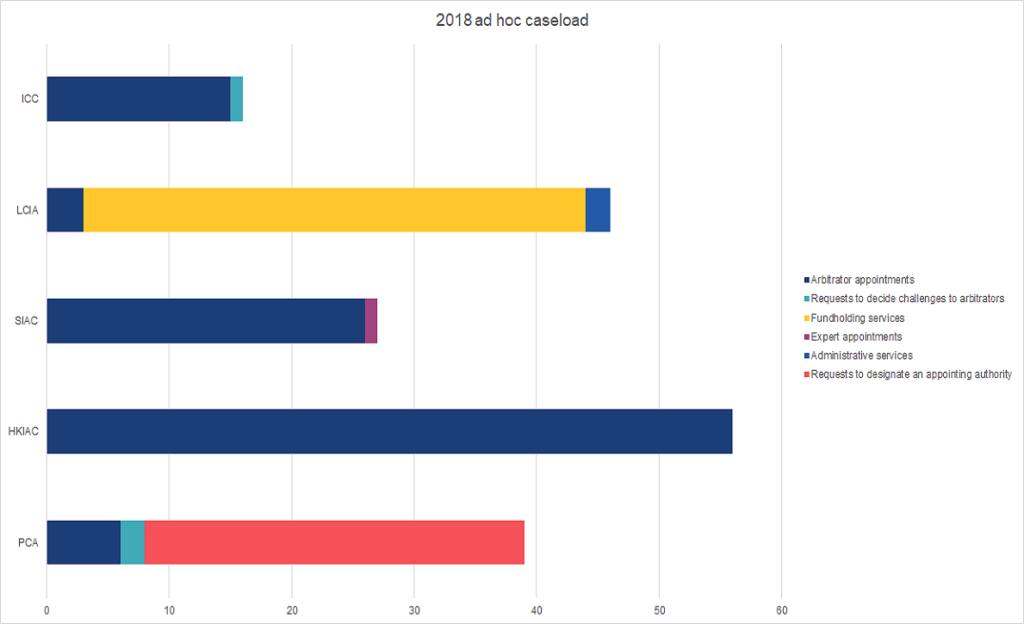Leading arbitral institutions regularly publish their case statistics, meaning there is reasonable visibility for the popularity of institutional arbitration. However, it is more difficult to reliably gauge ad hoc international arbitration trends across all sectors and jurisdictions. It is certainly clear from the new figures recently released by the London Maritime Arbitrators Association (“LMAA”) that London-seated ad hoc arbitration is thriving, and there are a number of other indications that ad hoc arbitration continues to be widely trusted.
Background
Parties may specify in their arbitration agreement that disputes will be resolved by ad hoc arbitration, or, as sometimes occurs, ad hoc arbitration may be the default position in the absence of the parties designating a particular arbitral institution to administer the arbitration. Parties to ad hoc arbitration may enlist the assistance of an institution for specific roles, such as designating an appointing authority to act in the event that they cannot agree on the choice of arbitrators, or to act as a fundholder (where the institution will hold and disburse deposits paid by the parties as advances on the arbitrators’ fees).
Ad hoc arbitration is particularly popular in certain sectors, including shipping, commodities and construction. Through their own specific organisations, a number of these sectors have developed arbitration rules tailored to their particular industries, such as the LMAA Terms for maritime arbitration and the Construction Industry Model Arbitration Rules.
Aside from industry-specific rules, parties may also turn to the UNCITRAL Rules, which are frequently adopted for ad hoc arbitration. Alternatively, parties may adopt a modified version of established rules, may devise their own set of rules, or may adopt no rules at all and leave the arbitration procedure for the parties and arbitrator(s) to determine once a dispute has arisen.
There will always be parties who prefer not to use ad hoc arbitration and it is often suggested that, due to the lack of institutional support, ad hoc arbitration can be more vulnerable to delay tactics and obstruction by an unwilling opponent. Institutions can also have a valuable role to play in controlling costs. Where procedural issues or other challenges arise which cannot be resolved by the tribunal, parties to ad hoc arbitration will need to rely on the local courts of the seat to seek relief and may have concerns about consequent loss of confidentiality. In some circumstances, ad hoc arbitration may turn out to be more time-consuming and expensive than institutional arbitration, making the choice between the two a delicate balance of priorities for parties. However, while there may be criticisms of ad hoc arbitration from some quarters, it is certainly clear from the publically available statistics that the ad hoc caseload remains sizeable.
The ability to opt for ad hoc arbitration reflects one of the most important advantages of arbitration, that of maximum flexibility. In an ad hoc arbitration the parties can choose their own procedure, rather than being tied to the rules of an institution. Arbitrating disputes on an ad hoc basis offers parties the option to resolve their disputes via simple procedures with less external support, which in certain circumstances, can reduce costs and the time taken to obtain an award. Further, some parties consider it preferable that the details of their dispute are only known to the parties and the tribunal itself. A final point of note is that many arbitrations conducted under ad hoc arbitration rules are progressed to a final award without an oral hearing. For example, the 2019 LMAA statistics show that the vast majority of LMAA cases are dealt with “on the documents”, with only around 15% of awards handed down in 2019 involving an oral hearing. This familiarity with virtual exchanges and the absence of routine oral hearings may offer parties welcome flexibility in light of the disruption being caused by the COVID-19 pandemic.
Recent trends in ad hoc arbitration
On 30 March 2020, the LMAA released its 2019 statistics. The report demonstrates a substantial increase in cases, with the estimated number of LMAA arbitrations rising by nearly 15% from 2018 figures. A total of 1,756 LMAA cases were reported for the 2019 year, and 526 awards were published (up from 508 in 2018). The latest statistics show that ad hoc arbitration remains a popular choice and is a widely trusted method of dispute resolution The significance of the LMAA figures can be appreciated more easily when placed in the context of the caseloads of popular arbitral institutions, as set out below for 2018:[1]
It is much more difficult to quantify the current ad hoc caseload in other sectors, where there are no figures of the kind released by the LMAA. However, it is clear that this ‘dark figure’ for the unknown volume of ad hoc arbitration is likely to be sizeable. As an indication of this, the Queen Mary University of London 2019 survey on international construction disputes reported that ad hoc arbitration was used in nearly a third of construction cases. The scale of ad hoc arbitration can also be visualised to some extent in the caseload reports of arbitral institutions, as institutions assist with specific aspects of some ad hoc arbitrations. The 2018 statistics of key arbitral institutions show a significant ad hoc-related caseload, as set out below:
It is difficult to assess with any degree of accuracy the relative popularity of different seats for ad hoc arbitration, given the lack of publically available statistics. It is certainly clear that there are a high number of London-seated ad hoc arbitrations, as the LMAA statistics demonstrate. The LMAA Terms 2017 designate England as the default arbitral seat and the vast majority of LMAA arbitrations are seated in London, meaning that there were well over 1,000 ad hoc arbitrations seated in London in 2019.
Comment
It is clear from the available data that ad hoc arbitration continues to be popular and that London remains important as a seat for ad hoc arbitration.
Whether ad hoc or institutional arbitration is preferable will always depend on the dispute in question. Many arbitration users have a strong preference for arbitrating with institutional support and these parties will continue to be attracted by the reputation, familiarity, convenience and transparency of the leading arbitral institutions.
However, ad hoc arbitration also has its advantages and many of the apparent disadvantages of ad hoc arbitration can be mitigated by a robust tribunal with strong case management skills. Parties preferring the flexibility of ad hoc arbitration will welcome the latest clear indications that ad hoc arbitration continues to thrive.
For more information, please contact Craig Tevendale, Partner, Rebecca Warder, Professional Support Lawyer, Caitlin Eaton, Associate, or your usual Herbert Smith Freehills contact.
[1] We have used 2018 figures as 2019 statistics are not yet available for all institutions.



